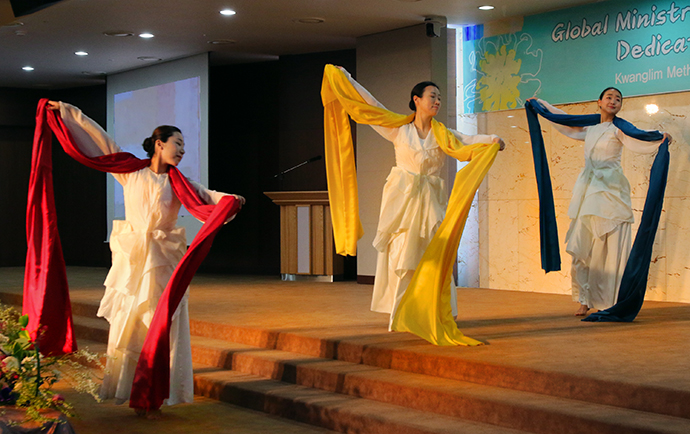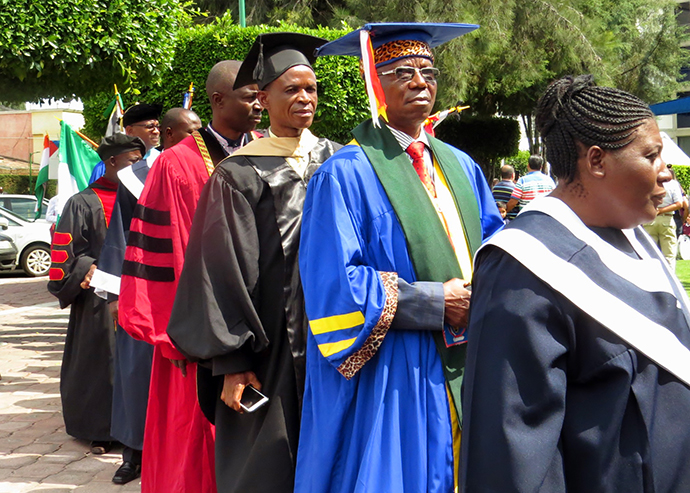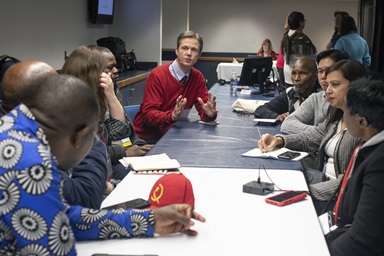The heads of Global Ministries, Discipleship and Higher Education and Ministry sat down with United Methodist News Service to review their 2017 work and outline plans for 2018. All three are focusing on partnerships, results and effectiveness.
Discipleship Ministries
The Rev. Junius B. Dotson speaks with great hope for The United Methodist Church’s future. The top executive of Discipleship Ministries comes to his role with experience as both a church planter and megachurch pastor.
In just about any context, he said, you will find a United Methodist congregation that knows how to reach people and make new disciples. Part of Discipleship Ministries’ job is to connect congregations in need of help with those practical, real-world examples.
“There are always success stories,” he said. “We can either learn from those success stories or we can continue to create a self-prophesying narrative of decline.”
Discipleship Ministries has the task of supporting local church and conference leaders in making Christian disciples. That work takes multiple forms.
The agency provides evangelism, children’s ministry and worship resources. Alongside the United Methodist Publishing House, it is providing staff support for the development of a new hymnal, which will go for a vote at the 2020 General Conference.
The agency’s ministries also includes New Church Starts (Path 1), which works with conferences to plant churches in the U.S. Path 1 has set a goal of planting a new faith community a day in the U.S. In addition, the agency encompasses Young People’s Ministries, Strengthening the Black Church for the 21st Century and the Native American Comprehensive Plan.
Among the best-known parts of the agency is the Upper Room, which provides devotionals and other resources for faith formation across the multinational denomination.
Over the past year, Discipleship Ministries has refined three strategic priorities for the coming years. They are:
- Improve disciple-making systems in every local church
- Engage with people who are currently outside the church, specifically those who claim no religious preference
- Cultivate contextualized local resources around the globe
As part of living into those priorities, the agency last year launched the “See All the People” campaign, which Dotson describes as a movement — not a program.
Specifically, the aim is to encourage United Methodists to shift their focus from fixing churches to connecting with people in their communities. “It’s designed to be a spark, a discussion starter, a way to help the church focus on its task of making disciples of Jesus Christ,” he said.
When people visit SeeAllthePeople.org, he hopes church members take inspiration from the different ways churches effectively nurture Christ followers. The campaign’s first resource is a guide for intentional discipleship.
This year, the agency plans to particularly focus on laity and release another guidebook on engaging the mission field.
“What we see our role is fueling this thing — not controlling it,” Dotson said.
Discipleship Ministries has budgeted to spend $12.1 million in 2018. Native American Comprehensive Plan and Strengthening the Black Church, both of which have separate budgets, plan to spend $305,000 and $501,000, respectively. The Upper Room is self-supporting.
Board of Global Ministries

Performers with the Nanumteo Dance Company offer an act of praise, “Peace Be With You,” at the March 23, 2017, dedication service for the new Asia regional office of United Methodist Global Ministries. In addition to the Korean dancers, the service included a Japanese musician and a Filipino music and dance ensemble. Photo by Jacob Lee, UMNS.
For Thomas Kemper, top executive of the Board of Global Ministries, 2017 was a time to affirm the mission agency’s presence in Atlanta after leaving its longtime headquarters in New York.
Accompanying the relocation was an expanded global reach as regional offices have opened outside the United States. “There are some real benchmarks that we have reached in 2017,” he told United Methodist News Service.
At the offices in midtown Atlanta, that has meant completing interior renovations to former classroom and office space at Grace United Methodist Church, although some work continues on the parking areas. Purchased by Global Ministries, the two-building church campus still has a worshipping congregation and the sanctuary is sometimes used by the mission agency as well.
“The real finishing was only done last year as we hired staff to complete our work force,” Kemper said.
He pointed to the successful United Methodist “presence and synergy” at the denomination’s Latin America office in Buenos Aires, which marked its first full year of operation in 2017. Global Ministries opened the office in cooperation with The Upper Room, while the Board of Higher Education and Ministry joined the partnership at the end of the year, he noted.
The March 2017 opening of a regional mission office in Seoul, Korea, also has strengthened the denomination’s presence in Asia, he explained, as well as the relationship with the Korean Methodist Church.
The whole idea of facilitating rather than “owning” the church’s mission “is more and more becoming reality in our day-to-day work,” Kemper said.
In 2017, Global Ministries increasingly implemented its plan to hold mission roundtables in different regions — led by trained facilitators — for multilateral dialogue and planning. The agency also is facilitating the ongoing investment in new starts of United Methodist churches, such as in the Central Africa Republic.
Local churches are involved in these efforts, too, through mission consultations and partnerships with other conferences and mission initiatives. And last year’s young adult Global Mission Fellows “had the most diverse class ever, from 20 different countries,” he said.
The agency also has focused on health, with its Abundant Health campaign, with a goal to reach 1 million children by 2020, and is conducting summits with church-related health systems. The work demonstrates that “health is something of our United Methodist heritage from John Wesley to today,” Kemper pointed out.
In the same way, the mission agency oversees the United Methodist Committee on Relief, which reflects “the deep Wesleyan conviction to keep works of mercy and piety together,” he said. As the disaster response and development arm of the church, UMCOR is continuing to focus on recovery work from the 2017 storms and hurricanes that hit Puerto Rico, Florida, Texas and Louisiana.
Also in 2017, more than 700 people participated in the agency’s annual School of Congregational Development during the summer, and Global Migration Sunday in early December brought denominational recognition to a global crisis.
In 2018, the Board of Global Ministries will:
- Continue its response to recovery from Hurricanes Harvey, Irma and Maria — $46 million has been raised so far — through UMCOR.
- Develop a specific proposal to open a regional mission office in Africa by 2019.
- Strengthen an emphasis on the care of creation, starting with a commissioning of “earthkeepers” at the end of January.
- Hold a Nov. 9-11 Korea peace consultation in Atlanta.
The mission agency’s budget for 2018 is $54.5 million. In addition, just over $12 million is budgeted for the United Methodist Committee on Relief and $5.6 million for Global Health.
Higher Education and Ministry

Methodist educators from Africa take part in the May 28, 2017, processional at the official opening of the International Association of Methodist-related Schools, Colleges and Universities in Puebla, Mexico. Photo by Sam Hodges, UMNS.
The United Methodist Board of Higher Education and Ministry, the denomination’s leadership development agency, surveyed 15,000 people about the leadership needs of the church — including assessment of current programs and future requirements.
“We are charged with equipping church leaders, both lay and clergy, from the cradle to the grave,” said the Rev. Kim Cape, top executive.
To meet that charge, the agency commissioned the survey by the ROI Institute, Cape said. She said the agency is assessing its capabilities to meet those needs and is working through a restructure to be more efficient. As part of that, the agency is using the ROI model — return on investment — for evaluation and goal setting, she said.
“We are hearing the church ask for results so we are doing an overhaul of how we are working,” Cape said.
Cape said she is especially excited about the agency’s development of a hybrid Clinical Pastoral Education program. The agency is now an official CPE site.
“We are initiating five cadres of eight to 10 local pastors in annual conferences throughout the connection,” Cape said of the CPE program. “We hope for full approval and implementation in one to two years.”
Some of the other highlights of 2017 included two colloquies, one on human sexuality and another on the mission of the church.
“The Unity of the Church and Human Sexuality: Toward a Faithful United Methodist Witness,” was held at Candler School of Theology, Emory University in Atlanta. A book from the event has been published.
“Missio dei and The United States: Toward a Faithful United Methodist Witness,” was held in Boston and bishops presented papers.
The agency also partnered with Wespath to create a scholarship program aimed at helping with clergy debt.
“We keep hearing one of the major roadblocks to entering ministry is debt,” Cape said.
The board is continuing to collaborate with Discipleship Ministries to support the E-Reader Project that has 1,500 users and is available in English, French and Portuguese. A Spanish version is in the works.
The final prototyping of the United Methodist Board of Higher Education and Ministry’s evaluation tool for clergy effectiveness was completed. The full rollout of the Leadership Development Inventory is scheduled for 2018.
“It is a very affordable tool, $40 online, and is behavior based. We have done the heavy lifting on identifying behaviors for effective ministry,” Cape said.
A denomination-wide task force has begun creating a leadership formation and development process for the new eight-year clergy assessment mandated at the 2016 United Methodist General Conference.
The assessment will be a part of a comprehensive leadership formation process that will extend from candidacy through retirement.
At the 2017 National Association of Schools and Colleges of The United Methodist Church meeting, the board of directors decided to convene conversations between bishops and college presidents in each jurisdiction focusing on how annual conferences and United Methodist-related schools can work together to support a culture of call.
The agency, which has global hubs in Asia Pacific, Africa, Europe, Latin America & Caribbean and North America, plans to expand to five more sites.
The 2018 budget is $44.7 million, down from $47.9 million in 2017.
Next: Three United Methodist agencies that advocate for social justice and equality have seen their issues rocket into international headlines in the past year.
UMNS reporters Heather Hahn, Linda Bloom and Kathy L. Gilbert wrote this story. Contact them at (615) 742-5470 or [email protected]. To read more United Methodist news, subscribe to the free Daily or Weekly Digests.
Like what you're reading? Support the ministry of UM News! Your support ensures the latest denominational news, dynamic stories and informative articles will continue to connect our global community. Make a tax-deductible donation at ResourceUMC.org/GiveUMCom.




